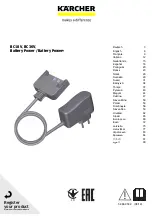
7
Residual Current Device (RCD)
— A Residual Current Device is integrated in the
Charging Robot.
— The RCD will break the current in case a residual
current exceeding 6mA DC or 30mA AC is detected.
— Disconnection time is according to EN 61008-1 and
IEC 62955.
— The RCD is automatically tested between each
charging session or at least every 24h.
— For manual initialization of the RCD-test, please
refer to the Installer App.
— The integrated RCD has no influence on the function
of external protective devices.
— An external RCD is required when at least one of the
below conditions are identified:
• The installation, including cable, junction boxes
etc., includes components with only basic
insulation (Class I).
• Any other electrical equipment apart from Easee
Home/Charge, including lamps and socket outlets,
is connected to the circuit.
• Any other conditions identified by the authorized
installer requiring an external RCD.
— The internal RCD is considered to provide the
required RCD protection for both AC and DC leakage
faults when all the below conditions are fulfilled:
• The installation, including cable, junction boxes
etc, is performed entirely with components
providing double or reinforced insulation (Class II).
• No other electrical equipment apart from Easee
Home/Charge, including lamps and socket outlets,
is connected to the circuit.
• No other conditions identified by the authorized
installer requiring an external RCD.



































